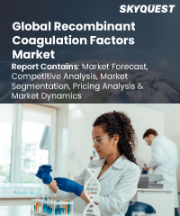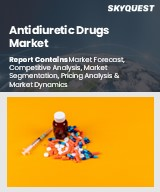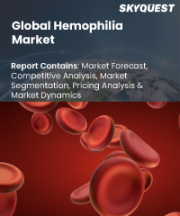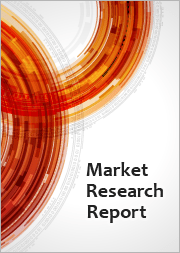
|
시장보고서
상품코드
1771542
혈우병 시장 : 규모, 점유율, 동향 분석, 질환 유형별, 치료 유형별, 치료법별, 유통 채널별, 지역별, 부문별 예측(2025-2030년)Hemophilia Market Size, Share & Trends Analysis Report By Type (Hemophilia A, Hemophilia B), By Treatment Type (On-demand, Cure), By Therapy, By Distribution Channel, By Region, And Segment Forecasts, 2025 - 2030 |
||||||
혈우병 시장의 성장과 동향 :
Grand View Research, Inc.의 최신 보고서에 따르면 세계 혈우병 시장 규모는 2025년부터 2030년까지 연평균 복합 성장률(CAGR) 6.91%로 성장하고, 2030년에는 210억 7,000만 달러에 이를 것으로 추정됩니다.
혈우병 치료를 위한 유전자 치료나 단일클론항체가 승인되어, 파이프라인에 그러한 후보가 복수 존재하는 것이 시장 성장의 주요 촉진 요인이 되고 있습니다. 또한, 사망률의 저하에 의해 혈우병 환자의 평균 수명이 연장되고 있는 것도 시장 성장을 가속하는 주요인입니다.
혈우병을 조절하는 신규 치료제의 개발과 상시가 시장 성장을 가속하고 있습니다. 제품 Sevenfact (응고 인자 VIIa(유전자 재조합) -jncw)를 승인했습니다. 또한, 혈우병 A 치료제인 BioMarin의 Roctavian이 유럽에서만 승인되었고, CSL의 Hemgenix(etranacogene dezaparvovec-drib)는 미국과 유럽 모두에서 승인되었다는 점은 다른 지역으로의 확장을 위한 기회를 보여줍니다. 바이오 마린의 록타비안은 이전에 거부 된 후 미국 FDA에서 검토 중이며 PDUFA 마감일은 2023년6월30 일에 설정되었습니다.
대기업은 신제품 개발과 전략적 제휴에 주력하여 지리적 존재를 높이고 있습니다. 2022년 4월, 노보 노디스크 A/S는 캐나다 혈액 서비스(Canadian Blood Services)와 제휴하여 A형 혈우병 치료에 시판되는 약물인 에스페록트(Esperoct)와 조노베이트(Zonovate)로 제품 제공을 강화했습니다. 또한 2023년 2월, 사노피(Sanofi)는 혈우병 A 치료용 혈액응고 제VIII인자 보충요법인 알투비오(Altuviiio)의 FDA 승인을 취득했습니다.
그러나 중국과 인도와 같은 신흥 국가에서는 경증에서 중등증 진단이 지연되는 것이 주요 저해 요인이되었습니다. 시장의 또 다른 주요 과제는 높은 비용과 장기 데이터 부족으로 인한 유전자 치료 접근성 문제입니다.
혈우병 시장 보고서 하이라이트
- 2024년의 혈우병 시장에서는 혈우병 A의 유병률이 높아, 그 치료에 복수의 제품이 이용 가능하기 때문에 A형 부문(segment)이 최대의 점유율을 차지하고 있습니다.
- 판매 채널별로는 전문 약국이 2024년에 가장 큰 시장 점유율을 차지했지만, 이것은 이 질환에 필요한 치료가 전문적이기 때문입니다.
- 치료법별로는 요인 보충요법이 2024년에 혈우병 시장에서 가장 큰 점유율을 차지했습니다.
- 북미는 2024년에 혈우병 시장에서 최대의 수익을 올리는 지역이며, 이것은 주요 기업의 존재, 규제 지원, 환자의 의식, 유리한 자금 원조에 기인하고 있습니다.
목차
제1장 조사 방법과 범위
제2장 주요 요약
제3장 혈우병 시장의 변수, 동향, 범위
- 시장 계통 전망
- 상위 시장 전망
- 관련/부수 시장 전망
- 시장 역학
- 시장 성장 촉진요인 분석
- 시장 성장 억제요인 분석
- 혈우병 시장 분석 도구
- 업계 분석 - Porter's Five Forces 분석
- PESTEL 분석
- 파이프라인 분석
제4장 혈우병 시장 : 질환 유형의 추정 및 예측 분석
- 질병 유형 시장 점유율, 2024년과 2030년
- 부문 대시보드
- 세계의 혈우병 시장 : 질환 유형별 전망
- 시장 규모와 예측 및 동향 분석, 2018년-2030년
- 혈우병 A
- 혈우병 B
- 기타
제5장 혈우병 시장 : 치료 유형의 추정 및 예측 분석
- 치료 유형 시장 점유율, 2024년과 2030년
- 부문 대시보드
- 세계의 혈우병 시장 : 치료 유형별 전망
- 시장 규모와 예측 및 동향 분석, 2018년-2030년
- 온디맨드
- 치료
- 예방
제6장 혈우병 시장 : 치료법 추정 및 예측 분석
- 치료법 시장 점유율, 2024년과 2030년
- 부문 대시보드
- 세계의 혈우병 시장 : 치료법별 전망
- 시장 규모와 예측 및 동향 분석, 2018년-2030년
- 요인 보충 요법
- 데스모프레신과 피브린 실란트
- 유전자 치료와 단일클론항체
제7장 혈우병 시장 : 유통 채널의 추정 및 예측 분석
- 유통 채널 시장 점유율, 2024년 및 2030년
- 부문 대시보드
- 세계의 혈우병 시장 : 유통 채널별망
- 시장 규모와 예측 및 동향 분석, 2018년-2030년
- 병원 약국
- 전문 약국
제8장 혈우병 시장 : 지역의 추정 및 예측 분석
- 지역 시장 점유율 분석, 2024년 및 2030년
- 부문 대시보드
- 세계의 지역별 시장 현황
- 시장 규모, 예측 동향 분석, 2018년-2030년
- 북미
- 미국
- 캐나다
- 멕시코
- 유럽
- 영국
- 독일
- 프랑스
- 이탈리아
- 스페인
- 노르웨이
- 스웨덴
- 덴마크
- 아시아태평양
- 일본
- 중국
- 인도
- 호주
- 한국
- 태국
- 라틴아메리카
- 브라질
- 아르헨티나
- 중동 및 아프리카
- 남아프리카
- 사우디아라비아
- 아랍에미리트(UAE)
- 쿠웨이트
제9장 경쟁 구도
- 주요 시장 진출기업에 의한 최근의 동향과 영향 분석
- 기업/경쟁의 분류
- 벤더 상황
- 주요 리셀러 및 채널 파트너 목록
- Key customers
- Key company market share analysis, 2024
- Takeda Pharmaceutical Company Limited.
- CSL Behring
- Pfizer Inc.
- Bayer AG
- BioMarin
- Spark Therapeutics, Inc.
- Sanofi
- F. Hoffmann La-Roche Ltd
- Novo Nordisk A/S
- Octapharma AG.
Hemophilia Market Growth & Trends:
The global hemophilia market size is estimated to reach USD 21.07 billion by 2030, registering a CAGR of 6.91% from 2025 to 2030, according to a new report by Grand View Research, Inc. The approval of gene therapy and monoclonal antibodies for treating hemophilia and the presence of multiple such candidates in the pipeline are major drivers for market growth. In addition, the increasing life expectancy of hemophilia patients due to reduced mortality is another key factor driving market growth.
The development and launch of novel therapies to control hemophilia are propelling the market growth. For instance, in April 2020, FDA approved the genetically engineered product Sevenfact [coagulation factor VIIa (recombinant)-jncw] as a treatment option to control bleeding episodes in adolescents (of age group 12 years and above) and adults. Furthermore, the presence of 2 gene therapy products, BioMarin's Roctavian for hemophilia A, was approved only in Europe, and CSL's Hemgenix (etranacogene dezaparvovec-drib) was approved both in the U.S., and Europe demonstrates an opportunity for expansion in other regions. BioMarin's Roctavian is under review with the U.S. FDA after its previous rejection and has a PDUFA date set for June 30, 2023.
Major players are focused on developing new products and entering into strategic collaborations for enhanced geographic presence. For instance, in April 2022, Novo Nordisk A/S partnered with Canadian Blood Services to enhance its product offering with marketed drugs Esperoct and Zonovate, publicly available for treating type A. Moreover, in February 2023, Sanofi received FDA approval for its drug Altuviiio, a factor VIII replacement therapy for treating hemophilia A.
However, a key restraining factor is the delayed diagnosis of mild to moderate disease in developing countries such as China and India. Another key challenge for the market is the possible access issues for gene therapy due to its high cost and lack of long-term data. For instance, the cost of treatment using Hemgenix (Approved in 2022) is USD 3.5 million per treatment, making it the most expensive treatment in the world.
Hemophilia Market Report Highlights:
- The type A segment held the largest share of the hemophilia market in 2024, owing to the higher prevalence of hemophilia A and the availability of multiple products for its treatment. This segment is also expected to grow at the highest CAGR during the forecast period owing to the approval of gene therapy.
- Based on the distribution channel, the specialty pharmacies segment held the largest market share in 2024, attributable to the specialized nature of the treatment required for the condition
- By therapy, factor replacement therapy held the largest share of the hemophilia market in 2024, as it is the major form of treatment used in both prophylaxis and on-demand treatment.
- North America was the largest revenue-generating region in the hemophilia market in 2024, which can be attributed to the presence of key players, regulatory support, patient awareness, and favorable funding assistance.
Table of Contents
Chapter 1. Methodology and Scope
- 1.1. Market Segmentation & Scope
- 1.2. Segment Definitions
- 1.2.1. Type
- 1.2.2. Treatment
- 1.2.3. Therapy
- 1.2.4. Distribution Channel
- 1.2.5. Regional scope
- 1.2.6. Estimates and forecasts timeline
- 1.3. Research Methodology
- 1.4. Information Procurement
- 1.4.1. Purchased database
- 1.4.2. GVR's internal database
- 1.4.3. Secondary sources
- 1.4.4. Primary research
- 1.4.5. Details of primary research
- 1.4.5.1. Data for primary interviews in North America
- 1.4.5.2. Data for primary interviews in Europe
- 1.4.5.3. Data for primary interviews in Asia Pacific
- 1.4.5.4. Data for primary interviews in Latin America
- 1.4.5.5. Data for Primary interviews in MEA
- 1.5. Information or Data Analysis
- 1.5.1. Data analysis models
- 1.6. Market Formulation & Validation
- 1.7. Model Details
- 1.7.1. Commodity flow analysis (Model 1)
- 1.7.2. Approach 1: Commodity flow approach
- 1.7.3. Volume price analysis (Model 2)
- 1.7.4. Approach 2: Volume price analysis
- 1.8. List of Secondary Sources
- 1.9. List of Primary Sources
- 1.10. Objectives
Chapter 2. Executive Summary
- 2.1. Market Outlook
- 2.2. Segment Outlook
- 2.2.1. Type
- 2.2.2. Treatment
- 2.2.3. Therapy
- 2.2.4. Distribution Channel
- 2.2.5. Regional outlook
- 2.3. Competitive Insights
Chapter 3. Hemophilia Market Variables, Trends & Scope
- 3.1. Market Lineage Outlook
- 3.1.1. Parent market outlook
- 3.1.2. Related/ancillary market outlook
- 3.2. Market Dynamics
- 3.2.1. Market driver analysis
- 3.2.2. Market restraint analysis
- 3.3. Hemophilia Market Analysis Tools
- 3.3.1. Industry Analysis - Porter's
- 3.3.1.1. Supplier power
- 3.3.1.2. Buyer power
- 3.3.1.3. Substitution threat
- 3.3.1.4. Threat of new entrant
- 3.3.1.5. Competitive rivalry
- 3.3.2. PESTEL Analysis
- 3.3.2.1. Political landscape
- 3.3.2.2. Technological landscape
- 3.3.2.3. Economic landscape
- 3.3.1. Industry Analysis - Porter's
- 3.4. Pipeline Analysis
- 3.4.1.1. Phase 1
- 3.4.1.2. Phase 2
- 3.4.1.3. Phase 3
Chapter 4. Hemophilia Market: Disease Type Estimates & Trend Analysis
- 4.1. Type Market Share, 2024 & 2030
- 4.2. Segment Dashboard
- 4.3. Global Hemophilia Market by Type Outlook
- 4.4. Market Size & Forecasts and Trend Analyses, 2018 - 2030 for the following
- 4.4.1. Hemophilia A
- 4.4.1.1. Market estimates and forecasts, 2018 - 2030 (USD Million)
- 4.4.2. Hemophilia B
- 4.4.2.1. Market estimates and forecasts, 2018 - 2030 (USD Million)
- 4.4.3. Others
- 4.4.3.1. Market estimates and forecasts, 2018 - 2030 (USD Million)
- 4.4.1. Hemophilia A
Chapter 5. Hemophilia Market: Treatment Type Estimates & Trend Analysis
- 5.1. Treatment Type Market Share, 2024 & 2030
- 5.2. Segment Dashboard
- 5.3. Global Hemophilia Market by Treatment Type Outlook
- 5.4. Market Size & Forecasts and Trend Analyses, 2018 - 2030 for the following
- 5.4.1. On-demand
- 5.4.1.1. Market estimates and forecasts, 2018 - 2030 (USD Million)
- 5.4.2. Cure
- 5.4.2.1. Market estimates and forecasts, 2018 - 2030 (USD Million)
- 5.4.3. Prophylaxis
- 5.4.3.1. Market estimates and forecasts, 2018 - 2030 (USD Million)
- 5.4.1. On-demand
Chapter 6. Hemophilia Market: Therapy Estimates & Trend Analysis
- 6.1. Therapy Market Share, 2024 & 2030
- 6.2. Segment Dashboard
- 6.3. Global Hemophilia Market by Therapy Outlook
- 6.4. Market Size & Forecasts and Trend Analyses, 2018 - 2030 for the following
- 6.4.1. Factor Replacement Therapy
- 6.4.1.1. Market estimates and forecasts, 2018 - 2030 (USD Million)
- 6.4.1.2. Plasma derived Factor Concentrates estimates and forecasts, 2018 - 2030 (USD Million)
- 6.4.1.2.1. Market estimates and forecasts, 2018 - 2030 (USD Million)
- 6.4.1.2.2. Factor VIII
- 6.4.1.2.2.1. Market estimates and forecasts, 2018 - 2030 (USD Million)
- 6.4.1.2.3. Factor IX
- 6.4.1.2.3.1. Market estimates and forecasts, 2018 - 2030 (USD Million)
- 6.4.1.3. Recombinant Factor Concentrates
- 6.4.1.3.1. Market estimates and forecasts, 2018 - 2030 (USD Million)
- 6.4.1.3.1.1. Factor VIII
- 6.4.1.3.1.1.1. Market estimates and forecasts, 2018 - 2030 (USD Million)
- 6.4.1.3.1.2. Factor VII
- 6.4.1.3.1.2.1. Market estimates and forecasts, 2018 - 2030 (USD Million)
- 6.4.1.3.1.3. Factor IX
- 6.4.1.3.1.3.1. Market estimates and forecasts, 2018 - 2030 (USD Million)
- 6.4.1.3.1.1. Factor VIII
- 6.4.1.3.1. Market estimates and forecasts, 2018 - 2030 (USD Million)
- 6.4.2. Desmopressin & Fibrin sealants
- 6.4.2.1. Market estimates and forecasts, 2018 - 2030 (USD Million)
- 6.4.3. Gene Therapy & Monoclonal Antibodies
- 6.4.3.1. Market estimates and forecasts, 2018 - 2030 (USD Million)
- 6.4.1. Factor Replacement Therapy
Chapter 7. Hemophilia Market: Distribution Channel Estimates & Trend Analysis
- 7.1. Distribution Channel Market Share, 2024 & 2030
- 7.2. Segment Dashboard
- 7.3. Global Hemophilia Market by Gender Outlook
- 7.4. Market Size & Forecasts and Trend Analyses, 2018 - 2030 for the following
- 7.4.1. Hospital Pharmacies
- 7.4.1.1. Market estimates and forecasts, 2018 - 2030 (USD Million)
- 7.4.2. Specialty Pharmacies
- 7.4.2.1. Market estimates and forecasts, 2018 - 2030 (USD Million)
- 7.4.1. Hospital Pharmacies
Chapter 8. Hemophilia Market: Regional Estimates & Trend Analysis
- 8.1. Regional Market Share Analysis, 2024 & 2030
- 8.2. Regional Market Dashboard
- 8.3. Global Regional Market Snapshot
- 8.4. Market Size, & Forecasts Trend Analysis, 2018 - 2030:
- 8.5. North America
- 8.5.1. U.S.
- 8.5.1.1. Key country dynamics
- 8.5.1.2. Regulatory framework/ reimbursement structure
- 8.5.1.3. Competitive scenario
- 8.5.1.4. U.S. market estimates and forecasts, 2018 - 2030 (USD Million)
- 8.5.2. Canada
- 8.5.2.1. Key country dynamics
- 8.5.2.2. Regulatory framework/ reimbursement structure
- 8.5.2.3. Competitive scenario
- 8.5.2.4. Canada market estimates and forecasts, 2018 - 2030 (USD Million)
- 8.5.3. Mexico
- 8.5.3.1. Key country dynamics
- 8.5.3.2. Regulatory framework/ reimbursement structure
- 8.5.3.3. Competitive scenario
- 8.5.3.4. Mexico market estimates and forecasts, 2018 - 2030 (USD Million)
- 8.5.1. U.S.
- 8.6. Europe
- 8.6.1. UK
- 8.6.1.1. Key country dynamics
- 8.6.1.2. Regulatory framework/ reimbursement structure
- 8.6.1.3. Competitive scenario
- 8.6.1.4. UK market estimates and forecasts, 2018 - 2030 (USD Million)
- 8.6.2. Germany
- 8.6.2.1. Key country dynamics
- 8.6.2.2. Regulatory framework/ reimbursement structure
- 8.6.2.3. Competitive scenario
- 8.6.2.4. Germany market estimates and forecasts, 2018 - 2030 (USD Million)
- 8.6.3. France
- 8.6.3.1. Key country dynamics
- 8.6.3.2. Regulatory framework/ reimbursement structure
- 8.6.3.3. Competitive scenario
- 8.6.3.4. France market estimates and forecasts, 2018 - 2030 (USD Million)
- 8.6.4. Italy
- 8.6.4.1. Key country dynamics
- 8.6.4.2. Regulatory framework/ reimbursement structure
- 8.6.4.3. Competitive scenario
- 8.6.4.4. Italy market estimates and forecasts, 2018 - 2030 (USD Million)
- 8.6.5. Spain
- 8.6.5.1. Key country dynamics
- 8.6.5.2. Regulatory framework/ reimbursement structure
- 8.6.5.3. Competitive scenario
- 8.6.5.4. Spain market estimates and forecasts, 2018 - 2030 (USD Million)
- 8.6.6. Norway
- 8.6.6.1. Key country dynamics
- 8.6.6.2. Regulatory framework/ reimbursement structure
- 8.6.6.3. Competitive scenario
- 8.6.6.4. Norway market estimates and forecasts, 2018 - 2030 (USD Million)
- 8.6.7. Sweden
- 8.6.7.1. Key country dynamics
- 8.6.7.2. Regulatory framework/ reimbursement structure
- 8.6.7.3. Competitive scenario
- 8.6.7.4. Sweden market estimates and forecasts, 2018 - 2030 (USD Million)
- 8.6.8. Denmark
- 8.6.8.1. Key country dynamics
- 8.6.8.2. Regulatory framework/ reimbursement structure
- 8.6.8.3. Competitive scenario
- 8.6.8.4. Denmark market estimates and forecasts, 2018 - 2030 (USD Million)
- 8.6.1. UK
- 8.7. Asia Pacific
- 8.7.1. Japan
- 8.7.1.1. Key country dynamics
- 8.7.1.2. Regulatory framework/ reimbursement structure
- 8.7.1.3. Competitive scenario
- 8.7.1.4. Japan market estimates and forecasts, 2018 - 2030 (USD Million)
- 8.7.2. China
- 8.7.2.1. Key country dynamics
- 8.7.2.2. Regulatory framework/ reimbursement structure
- 8.7.2.3. Competitive scenario
- 8.7.2.4. China market estimates and forecasts, 2018 - 2030 (USD Million)
- 8.7.3. India
- 8.7.3.1. Key country dynamics
- 8.7.3.2. Regulatory framework/ reimbursement structure
- 8.7.3.3. Competitive scenario
- 8.7.3.4. India market estimates and forecasts, 2018 - 2030 (USD Million)
- 8.7.4. Australia
- 8.7.4.1. Key country dynamics
- 8.7.4.2. Regulatory framework/ reimbursement structure
- 8.7.4.3. Competitive scenario
- 8.7.4.4. Australia market estimates and forecasts, 2018 - 2030 (USD Million)
- 8.7.5. South Korea
- 8.7.5.1. Key country dynamics
- 8.7.5.2. Regulatory framework/ reimbursement structure
- 8.7.5.3. Competitive scenario
- 8.7.5.4. South Korea market estimates and forecasts, 2018 - 2030 (USD Million)
- 8.7.6. Thailand
- 8.7.6.1. Key country dynamics
- 8.7.6.2. Regulatory framework/ reimbursement structure
- 8.7.6.3. Competitive scenario
- 8.7.6.4. Thailand market estimates and forecasts, 2018 - 2030 (USD Million)
- 8.7.1. Japan
- 8.8. Latin America
- 8.8.1. Brazil
- 8.8.1.1. Key country dynamics
- 8.8.1.2. Regulatory framework/ reimbursement structure
- 8.8.1.3. Competitive scenario
- 8.8.1.4. Brazil market estimates and forecasts, 2018 - 2030 (USD Million)
- 8.8.2. Argentina
- 8.8.2.1. Key country dynamics
- 8.8.2.2. Regulatory framework/ reimbursement structure
- 8.8.2.3. Competitive scenario
- 8.8.2.4. Argentina market estimates and forecasts, 2018 - 2030 (USD Million)
- 8.8.1. Brazil
- 8.9. MEA
- 8.9.1. South Africa
- 8.9.1.1. Key country dynamics
- 8.9.1.2. Regulatory framework/ reimbursement structure
- 8.9.1.3. Competitive scenario
- 8.9.1.4. South Africa market estimates and forecasts, 2018 - 2030 (USD Million)
- 8.9.2. Saudi Arabia
- 8.9.2.1. Key country dynamics
- 8.9.2.2. Regulatory framework/ reimbursement structure
- 8.9.2.3. Competitive scenario
- 8.9.2.4. Saudi Arabia market estimates and forecasts, 2018 - 2030 (USD Million)
- 8.9.3. UAE
- 8.9.3.1. Key country dynamics
- 8.9.3.2. Regulatory framework/ reimbursement structure
- 8.9.3.3. Competitive scenario
- 8.9.3.4. UAE market estimates and forecasts, 2018 - 2030 (USD Million)
- 8.9.4. Kuwait
- 8.9.4.1. Key country dynamics
- 8.9.4.2. Regulatory framework/ reimbursement structure
- 8.9.4.3. Competitive scenario
- 8.9.4.4. Kuwait market estimates and forecasts, 2018 - 2030 (USD Million)
- 8.9.1. South Africa
Chapter 9. Competitive Landscape
- 9.1. Recent Developments & Impact Analysis, By Key Market Participants
- 9.2. Company/Competition Categorization
- 9.3. Vendor Landscape
- 9.3.1. List of key distributors and channel partners
- 9.3.2. Key customers
- 9.3.3. Key company market share analysis, 2024
- 9.3.4. Takeda Pharmaceutical Company Limited.
- 9.3.4.1. Company overview
- 9.3.4.2. Financial performance
- 9.3.4.3. Product benchmarking
- 9.3.4.4. Strategic initiatives
- 9.3.5. CSL Behring
- 9.3.5.1. Company overview
- 9.3.5.2. Financial performance
- 9.3.5.3. Product benchmarking
- 9.3.5.4. Strategic initiatives
- 9.3.6. Pfizer Inc.
- 9.3.6.1. Company overview
- 9.3.6.2. Financial performance
- 9.3.6.3. Product benchmarking
- 9.3.6.4. Strategic initiatives
- 9.3.7. Bayer AG
- 9.3.7.1. Company overview
- 9.3.7.2. Financial performance
- 9.3.7.3. Product benchmarking
- 9.3.7.4. Strategic initiatives
- 9.3.8. BioMarin
- 9.3.8.1. Company overview
- 9.3.8.2. Financial performance
- 9.3.8.3. Product benchmarking
- 9.3.8.4. Strategic initiatives
- 9.3.9. Spark Therapeutics, Inc.
- 9.3.9.1. Company overview
- 9.3.9.2. Financial performance
- 9.3.9.3. Product benchmarking
- 9.3.9.4. Strategic initiatives
- 9.3.10. Sanofi
- 9.3.10.1. Company overview
- 9.3.10.2. Financial performance
- 9.3.10.3. Product benchmarking
- 9.3.10.4. Strategic initiatives
- 9.3.11. F. Hoffmann La-Roche Ltd
- 9.3.11.1. Company overview
- 9.3.11.2. Financial performance
- 9.3.11.3. Product benchmarking
- 9.3.11.4. Strategic initiatives
- 9.3.12. Novo Nordisk A/S
- 9.3.12.1. Company overview
- 9.3.12.2. Financial performance
- 9.3.12.3. Product benchmarking
- 9.3.12.4. Strategic initiatives
- 9.3.13. Octapharma AG.
- 9.3.13.1. Company overview
- 9.3.13.2. Financial performance
- 9.3.13.3. Product benchmarking
- 9.3.13.4. Strategic initiatives
(주말 및 공휴일 제외)









